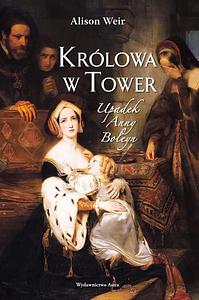You need to sign in or sign up before continuing.
Take a photo of a barcode or cover
I attempted to finish the book but Weir just drones on and on. She jumps around during Anne's reign. I gave it the college try.
Well researched and well written. A fascinating account of Queen Anne Boleyn's fall from grace and favor and her ultimate end on the scaffold.
This is a great book to read to accompany Weir’s historical fiction Anne Boleyn novel, which gives a far more detailed explanation of her orchestrated downfall (her given POV in the novel is understandably vague).
informative
reflective
sad
tense
slow-paced
informative
slow-paced
Well written and informative. Alison Weir is an incredible researcher. I do wish the writing was a bit more engaging. I know it is nonfiction, but I feel like it could still be slightly more readable.
A great approach to history and an interesting subject. Weir did a great job on this and as long as you care about Anne Boelyn you should enjoy this; even if you hate history or nonfiction topics.
I am an avid follower of Alison Weirs Tudor Biographies. They are always very well researched and Alison rarely comes to a decision but lays out all the evidence allowing you to make up your own mind.
This chunky book focuses purely on Anne Boleyn's swift downfall and execution. It gives a great insight into how her fall was engineered by Cromwell and other enemies and how trumped up and ridiculous most; if not all the charges were.
Whilst I am not a massive fan of Ann Boleyn-she was haughty and often cruel and vindictive this book made me feel for her. She did not deserve the end she got. I was amazed to learn that as Anne was up on charges of treason she was not allowed to to question any of the witness giving evidence against her, she couldn't summon anyone to speak for her or give evidence herself!
The book doesn't give a great insight into Henry VII thoughts and feelings (but then evidence is scant). I find Henry hard to fathom- How could a man who spent six long years trying to get rid of his first wife so he could marry Anne have her beheaded less than two years later on such flimsy evidence. I was amazed that he never saw her after her arrest or allowed her to plead her innocence.
its all very interesting stuff!
This chunky book focuses purely on Anne Boleyn's swift downfall and execution. It gives a great insight into how her fall was engineered by Cromwell and other enemies and how trumped up and ridiculous most; if not all the charges were.
Whilst I am not a massive fan of Ann Boleyn-she was haughty and often cruel and vindictive this book made me feel for her. She did not deserve the end she got. I was amazed to learn that as Anne was up on charges of treason she was not allowed to to question any of the witness giving evidence against her, she couldn't summon anyone to speak for her or give evidence herself!
The book doesn't give a great insight into Henry VII thoughts and feelings (but then evidence is scant). I find Henry hard to fathom- How could a man who spent six long years trying to get rid of his first wife so he could marry Anne have her beheaded less than two years later on such flimsy evidence. I was amazed that he never saw her after her arrest or allowed her to plead her innocence.
its all very interesting stuff!
I listened to the audio version (really great job by the narrator). The fall of Ann Boleyn is explored from just about every angle in this book. Weir does an excellent job at presenting all the facts and evidence (and where you can locate it). The Appendix even has a neat summary of Ann Boleyn, George Boleyn, and other people close to the scandal whose ghosts have appeared all over England.
Weir has already written a half dozen books on the Tudors,so I wasn't sure what she would have to add here. I was pleasantly surprised; the consummate scholar, Weir has continued to do primary document research and has modified some of her theories about the relationship between Anne Boleyn and Henry VIII. Weir hesitates over the key question: did Henry believe Anne guilty of adultery, or did he knowingly and intentionally send his innocent wife and 5 subjects to the block for political purposes? Weir concludes that while Anne probably suffered from a "miscarriage of justice", Henry likely believed the charges, although they certainly proved marvelously convenient.
This may be slow going for those not familiar with the story; her _The Six Wives of Henry VIII_ is a better introduction. Includes a fun chapter on Anne Boleyn ghost stories and legends.
This may be slow going for those not familiar with the story; her _The Six Wives of Henry VIII_ is a better introduction. Includes a fun chapter on Anne Boleyn ghost stories and legends.
I'm slightly obsessed with the Tudors and always have been and Anne Boleyn has long been my favorite of Henry's wives. I've read a number of books about her and this one was good. It outlined many reasons showing the probability that Anne was innocent or at least mostly innocent of the charges laid against her, something I've always believed. So much of what she was accused of just doesn't make sense. I didn't find this to be the strongest of Weir's books I've read (I loved Innocent Traitor - a fictional account about Lady Jane Grey and The Children of England - non-fiction about Henry's three children) but it was a good account outlining Anne's final days.







